Book Digest: February 12, 2007
Cultural moments that seem to have gained weight and currency in recent years strike me as just so much noise and special effects—which does not augur well for the literary narrative, if you look at the hoopla and attendant regurgitation of the advertisements on the modern version of Bread and Circuses, the Super Bowl. But then maybe I am looking at the wrong obvious things. The Academy Awards and March Madness also unleash versions of media hysteria, if not mass hysteria. Possibly there is a significant disjunction between the gibberish that is broadcast and what real people in the real world care about. Let me know, if you are an inhabitant of the real world.
In the past week I read Atul Gawande’s forthcoming Better: A Surgeon’s Notes on Performance and Louis Begley’s Matters of Honor—wonderful antidotes to the creeping moronization I fear as much as premature senescence and other geriatric maladies. Other good reading on the horizon, from a veritable United Nations of writers: Mayra Montera’s Dancing to Almendra, Jonathan Raban’s Surveillance, and Yael Goldstein’s Overture.
A non-literary concern that occupied me recently, which I am trying tie to an evermore elaborate and elusive critique of our globalized late-capitalist market economy, is the increasing consumption of toilet paper in this country—how else to explain the sales of 20-double-roll packages, this mania to warehouse various necessities—perhaps this factoid should be added to the leading economic indicators.
Anyway, can this bode well?
Still Water Saints by Alex Espinoza
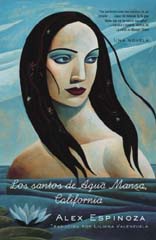
Mexican-born Alex Espinoza, the youngest of 11 children (imagine that), studied under Susan Straight at the University of California at Riverside and went on to receive an MFA from UC Irvine, where he was the editor of the university’s literary magazine. He now teaches creative writing at UC Riverside. In Still Water Saints, his debut novel, he creates the town of Agua Mansa and populates it with people (largely Latino) whose stories revolve around Perla Portillo, the owner of Botánica Oshún, and her varied attempts to help and guide them through all manner of difficulties. Joy Nicholson zeroes in on Espinoza’s effort:
Even in the lightest episodes…[Espinoza] is incapable of false or flimsy storytelling. His style is ominous, layered and clean—reminiscent of a Hieronymus Bosch painting. “Still Water Saints” is charming, yet its charm is an uneasy one. Its whimsy has teeth. And that is, absolutely, a compliment…If there is a flaw in the novel, it is that each character’s story is so immediately rendered, so involving, that the reader wants to follow its full trajectory. But just as we connect, another of Perla’s clients is introduced, described and emotionally calibrated…
» Read an excerpt from Still Water Saints
The Fabric of Night by Christoph Peters, translated by John Cullen
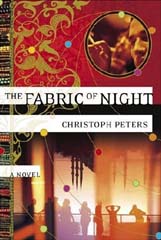
Well, it’s obvious that other than paying unavoidable (as much we try) attention to our native-born Spanish-language authors, we Americans are much lacking in interest in world literature. And I, sadly, include myself in that indictment. Thus I was unaware of Christoph Peters, who is well regarded in his native Germany. Born in 1966, Peters first studied painting from 1988 to 1994 at the National Academy of Arts in Karlsruhe. His debut novel Stadt Land Fluss [City Country River] was awarded the Aspekte Prize for Literature, and in 2001 he published a collection of short stories called Kommen und gehen, manchmal bleiben. [roughly translated, Come and Go, Sometimes Remain]. In the Fabric of Night, sculptor and alcoholic Albin Kranz and his girlfriend go to Istanbul to resuscitate their failing relationship. While on the roof terrace of his hotel, Katz witnesses the murder of an American gem dealer, but Katz cannot persuade anyone what he saw or even round up any proof. Thus, he throws himself into investigating the crime against the exotic physical setting of Istanbul and the psychological barrier of skepticism and disbelief. In the hands of a skillful writer, those are promising ingredients.
» Read an excerpt from The Fabric of Night
Self Storage by Gayle Brandeis
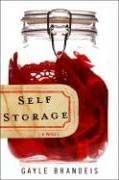
Flan Parker, this novel’s protagonist, makes a living supporting her dissertation-writing, slacker husband and their two children by buying the auctioned contents of abandoned storage units. This tale revs up when she wins a bid on a mysterious box that has some unclear connection to Walt Whitman’s Leaves of Grass. She is led to her burqa-clad Afghan neighbor out of a heightened curiosity about things around her—since this novel is set in the year following the attacks of September 11, and much portentous ruminating follows. This is Brandeis’s third book; the first two are The Book of Dead Birds, which won Barbara Kingsolver’s Bellwether Prize for Fiction in Support of a Literature of Social Change in 2002, and Fruitflesh: Seeds of Inspiration for Women Who Write. Adam Langer maintains that Brandeis’s novel is “deftly plotted and engagingly told… [and] is a suspenseful, thought-provoking, and inspiring exploration of what it means to be a sensitive and thoughtful human being living in George W. Bush’s America.”
» Read an excerpt from Self Storage
Reading Legitamation Crisis in Tehran: Iran and the Future of Liberalism by Danny Postel
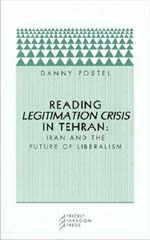
Prickly Paradigm Press is a wonderful and valuable publisher of vital “pamphlets,” that if allowed the light of day would roil the still and stagnant waters of conventional wisdom, as happens in Danny Postel’s discovery and analysis of a liberal renaissance taking place in international bogeyman Iran. Postel critiques progressives’ confusion about Iran, and the book concludes with an extended and illuminating dialogue between Postel and the eminent (and jailed) Iranian philosopher Ramin Jahanbegloo. Slovene psychoanalyst Slavoj Zizek remarks:
The importance of Postel’s book reaches far beyond a mere exercise in intellectual history. The temptation is either to castigate Iran as a state run by dangerous fundamentalist fanatics, or to celebrate it as a beacon of anti-imperialist resistance. Both approaches miss the complexity of intellectual and political life in Iran where, in a unique short-circuit, political battles reverberate in the terms of modern Western philosophy: Some traditionalist clerics refer to Heidegger, liberals to Habermas, feminists to Arendt, some young “nihilists” to deconstruction… The specter of an exotic country is thus dispelled, and we can recognize in Iran our own battles, fought more passionately than in our own countries. This is Postel’s great lesson: Iran’s story is our own.
Something to consider as the war drums beat. And, so as to preempt the kind of disinformation that proceeded the Iraq debacle, it seems reasonable to collect some information about Iran, right?
United States vs. George Bush, et al. by Elizabeth de la Vega
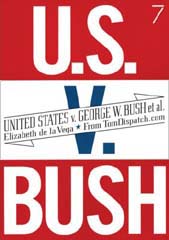
Elizabeth de la Vega is a former federal prosecutor with more than 20 years of experience, including as a member of the Organized Crime Strike Force and Chief of the San Jose branch of the U.S. Attorney’s office for the Northern District of California. She writes for The Nation, the Los Angeles Times, and Salon, as well as Tomdispatch.
Whatever your opinion of the Iraqi disaster (can you guess mine?), doesn’t it strike you as, uh, odd that impeachment of the President Bush is not on the table? If the critics of this $350 billion-plus policy are close to correct, shouldn’t Congress be considering some legal sanction—or as de la Vega puzzles, “Did our highest government officials employ the universal techniques of fraudsters—deliberate concealment, misrepresentations, false pretenses, half-truths—to deceive Congress and the American people?” She has reviewed the evidence, researched the law, and drafted an indictment. The defendants are George W. Bush, Richard Cheney, Donald Rumsfeld, Condoleezza Rice, and Colin Powell. The crime is conspiracy to defraud the United States. So now what?
A Good War is Hard to Find: The Art of Violence in America by David Griffith
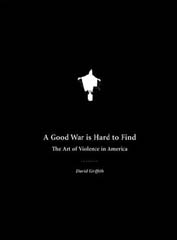
Gregory Wolfe, editor of the journal Image, says of David Griffith:
Conjectures of a Guilty BystanderSeeds of Destruction
This compelling book of essays by Griffith focus on the shift from language to image and the disjunction of the image and consequences of what is shown and is are resonant of Susan Sontag’s Regarding the Pain of Others. It additionally has references to a broad cultural smorgasbord including Warhol, Star Trek, and recent war atrocities. Sparked by the failure of Americans to come to grips with Abu Ghraib, David Griffith ruminates on how we as a culture have come to view violence and cruelty. The essays are accompanied by illustrated facts about torture, and along the bottom of each page, the reader will find a continuous timeline of the development of torture practices and pertinent historical events. The book includes lists of torture methods and their long-term effects, as well as graphics such as the schematics of the “pain pathways” in the human body.
African Psycho by Alain Mabanckou
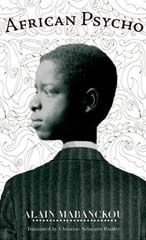
Given what I perceive as an African literary boomlet (this refers to the interest in the U.S., not a sudden surge in productivity) with Chris Albani, Chimamanda Ngozi Adichie, and Uzodinma Iweala, I suspect that this novel, with echoes of Brett Easton Ellis’s controversial novel American Psycho, might be ignored because of its harrowing subject matter—a would-be serial killer, Gregoire Nakobomayo, and the relationship he develops with his phantom mentor, a far more accomplished serial killer, Angoualima.
Mabanckou does not eschew gruesome descriptions but manages to inject humor into the narrative, like calling Gregoire’s shantytown, “Celui-qui-boit-de-l’eau-est-un-idot” [He-Who-Drinks-the-Water-Is-an-Idiot]. Alain Mabanckou was born in 1966 in Congo-Brazzaville and currently lives in the United States, where he teaches literature at the University of Michigan. He has six volumes of poetry and five novels (two receiving awards) to his credit. African Psycho was well received in France, which does not recommend it here in the U.S., but which does commend Richard Nash’s Soft Skull Press for attempting to bring it to American eyes.
» Read an excerpt from African Psycho
Giraffes by Steven Gillis

Steven Gillis is Dandy Dan Wickett’s co-conspirator in the newly formed Dzanc Books, a literary/literacy activist, a teacher, and father of two. He is also the author of two novels, The Weight of Nothing and Walter Falls, and now this collection of 11 short stories, all of which have been previously published in those wonderful small literary magazines you have been ignoring. Perhaps you should be paying more (some) attention.
» Read an excerpt from Giraffes
The Devil Is a Gentleman: Exploring America’s Religious Fringe by J.C. Hallman
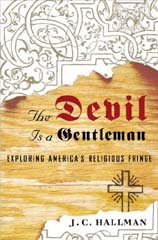
Speaking of paying attention, I recently noted the publication of Robert Richardson’s significant biography of American intellectual titan William James—which, given James’s role in America’s intellectual development, seems like an obvious book for me to notice, despite my small regard for hyper-detailed, large biographies. James Hallman wrote me to inform me of his book, which deals with James and his seminal work, The Varieties of Religious Experience, in the larger context of American religious pluralism and seeks to understand the connections with contemporary movements. In any case, J.C. Hallman is a graduate of the Iowa and Johns Hopkins writing programs and has published fiction and nonfiction in national magazines. And his first book, The Chess Artist, was an original take on chess.
» Read an excerpt from The Devil Is a Gentleman
Medical Apartheid: The Dark History of Medical Experimentation on Black Americans from Colonial Times to the Present by Harriet A. Washington
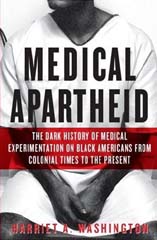
The title tells it all, and Harriet Washington—whose impeccable and impressive credentials include having been a fellow in ethics at the Harvard Medical School, a fellow at the Harvard School of Public Health, and a senior research scholar at the National Center for Bioethics at Tuskegee University—tells in it grim detail, just in time for Black History Month.
» Read an excerpt from Medical Apartheid
Born in Flames: Termite Dreams, Dialectical Fairy Tales, and Pop Apocalypses by Howard Hampton
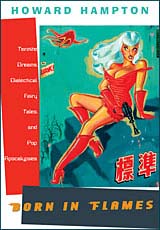
Speaking of titles, I am loving this tome’s, though I must confess to having been ignorant as perhaps Sara Vowell, who said, “Who is Howard Hampton? Who the hell isn’t he? A tragicomic master of doom and glee, of seething and serenity, analysis and outbursts, horror and hope, he’s the fun kind of unsettling. Somehow, this closest of close-ups inside his own trickster head ends up also being an accurate wide shot of American art and life.” The 40 pieces in this anthology representing some 20 years of Hampton’s writing on a broad cultural panorama are, quite simply, a hoot. This is, of course, subject to change but my favorite piece is “Apocrypha Now! An Imaginary Discography of Thomas Pynchon’s Paranoids.” Here’s Hampton on this collection:
These travels through parallel dimensions of music and film (movies as rock ‘n’ roll, rock as imaginary cinema) means to dig up the visceral logics connecting iconic forms. They’re also talismans of underground continuums—often-unrecognized co-conspirators carrying on surreptitious conversations with each other and within themselves part and parcel of the inescapable spectacle we are immersed in. All the figures assembled here…are mere bit players in a bigger picture. Within a context where life is constantly being remade as a lousy sequel to itself, what’s at stake in any creative situation is the ability to seize an opening and inject a note of danger, ardor, obsession or black humor into the proceedings.
» Read an excerpt from Born in Flames
Jasper Johns: An Allegory of Painting, 1955-1965 by Jeffrey Weiss, with John Elderfield, Carol Mancusi-Ungaro, Robert Morris, and Kathryn Tuma
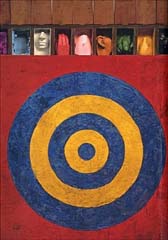
This monograph on Jasper Johns, who, arguably, is one of the most significant figures in postwar art, serves as the catalogue for an exhibition at the National Gallery of Art through Apr. 29 (and at the Kunstmuseum in Basel from June 2 to Sept. 9).
The 250 images included here focus on the 10 years beginning in 1955, which, it is argued, were very important in the development of the art of that period. And the scholarship by eminent art historians in this book frames that decade as a seminal theme—using his iconic paintings such as Target With Four Faces, Diver, Periscope (Hart Crane), and Arrive-Depart as cases-in-point.
